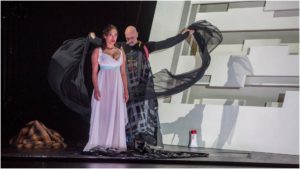
Spoleto Festival USA 2018 Review – Tree of Codes: Liza Lim’s Work Provides Visual Dazzle But No Vocal Highlights
By Kurt GottschalkThe Australian composer Liza Lim received royal treatment at the 2018 edition of South Carolina’s Spoleto USA Festival in May, with the premiere of a new opera and two chamber works scheduled for the program and the esteemed JACK Quartet, adding another work to the proceedings upon hearing that she would be in residency. In addition to the quartet, the instrumental works included a piece for solo wood block and one for mixed ensemble, and pointed to Lim’s strengths as an orchestrator (perhaps outshining her writing for voice).
But Lim’s “Tree of Codes” was clearly the focal point for her visit. It was one of three operas presented during the 18-day festival and the only contemporary one. It was also a challenging one, taking place (as the composer noted in the program) during “an extra day of life” at a time when “the boundaries between the natural world […] and machines are dissolving.”
The Appetizers
Presenting multiple works by the composer nicely contextualized the opera within the composer’s own aesthetic. Her “The Heart’s Ear (2017, for flute, clarinet and strings),” based on a Sufi melody and a verse by the poet Rumi, was played by members of the Spoleto Festival USA Orchestra. It’s a very fluid work with rich and warm instrumentation, moving between extreme dynamic shifts and from pizzicato to arco sections as easily as the currents in a stream, and ending rather surprisingly with a jumping and rolling unaccompanied violin.
Another concert included her “An Elemental Thing” for solo wood block. Unlike the purposeful “The Heart’s Ear,” this piece seemed to carry on without direction. It was, perhaps, a bit like a map of the pinhole lights of the cosmos upon which we project our own designs and greater significances. But that might be generous. It came off a bit more like a simple cataloging of sounds the composer was able to conjure (or have conjured) from a chunk of wood.
The JACK Quartet already had “The Weaver’s Knot” in its book, and so added the piece to a program including works by Mozart, Schubert and a Jenö Hubay arrangement of themes from Bizet’s “Carmen.” The fantastically tense lines and sometimes dizzying harmonies underscored the talent Lim possesses.
Intriguing & Confusing
Such riches were on display in her “Tree of Codes,” which received its premiere on May 26 in the Dock Street Theater in Charleston’s historic district. Written for three voices and a 17-piece orchestra, the work was in equal parts intriguing and confusing. A vaguely dystopian storyline and intriguing set design successfully made it hard to even quite discern what was, in a sense, objective reality.
Referring back to the program notes, Lim informed her audience that “if there is a ‘story,’ it is about the basic ephemerality that attends our lives and our deaths, and a longing for intensity, iridescence, for epiphany.” The work was inspired by the Jonathan Safran Foer book “Tree of Codes,” which in turn got its title from Bruno Schulz’s dreamlike “Street of Crocodiles (reduced as “sTREET OF croCODilES”).” Strictly speaking, sense was not to be expected.
The setting was gorgeous, lit in deep red behind a purple scrim, seeming both ancient and modern. A structure, a sort of upward view of a skyscraper, dominated the stage, where a woman was being fitted for a dress in the opening moments behind what seemed like beads of data projected onto the screen. The gorgeous soprano of Marisol Mantalvo slowly rose above the slippery orchestration. She successfully lifted Lim’s work from interesting to enticing. (We would be treated to another appearance by Montalvo during a concert of chamber works, singing Unsuk Chin’s wonderfully twist-tied “Akrostichen-Wordspiel”).
At just 75 minutes, there was plenty of room for more luxuriating, more time to take in the best parts of the production. Passages could have been extended that would have allowed the audience to relish in the stunning visual design and Lim’s wonderful orchestration, which is to say that the writing for voice wasn’t the strongest part of the production.
As for story, this reviewer was at a loss. A man who felt guilty because his father created the artificial world in which he lives falls in love with a woman who believes it is possible to live a natural life in unnatural environs? A constructed reality, perhaps, after a comet collision wiped out most of the life on Earth? I might have been willing to go there were it not for the self-aware referencing of their theatrical pursuit in the libretto.
Unsung Opera
Elsewhere in the festival, composer Doug Balliett presented his “Gawain’s Journey (performed by JACK and the St. Lawrence String Quartet),” a setting of a medieval poem with no singer but the text of the poem was presented line by line in supertitles. “Tree of Codes” raised in my mind the notion of an opera as a tableaux with actors moving about the surface, interesting to the eye, with music full of tension and beauty and with the libretto in supertitles, not a note sung, not a word spoken. It would have fit the world Lim suggested, where characters might as well have been able to communicate telepathically anyway, and allowed (to borrow a term from Anthony Braxton) the “friendly experiencer” to focus on the most satisfying parts of the production.
Lim has three previous operas to her credit, unfamiliar to this reviewer, which may speak more highly of her writing for voice. Or perhaps, greater promise might be held in her penning what we might call an “unsung opera.” Either way, the strengths on display, with a simple shift of focus, easily outweighed the weaker branches of her “Tree of Codes.”


